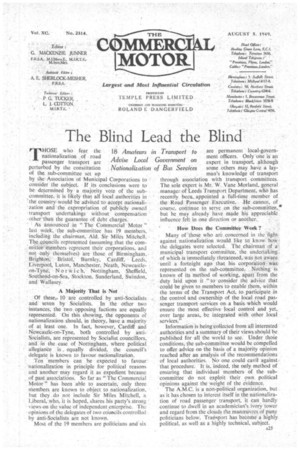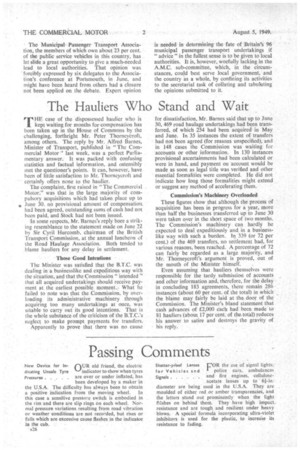The Blind Lead the Blind
Page 27

Page 28

If you've noticed an error in this article please click here to report it so we can fix it.
HOSE who fear the nationalization of road
passenger transport are perturbed by the constitution of the sub-committee set up by the Association of Municipal Corporations to consider the subject. If its conclusions were to be determined by• a majority vote of the subcommittee,it is likely that all local authorities in :the eountry-would be'advised' to accept natiOaali'2ation and the expropriation of publicly owned transport undertakings without compensation
• Other :than the guarantee Of debt charges.
; As announced in "The. Commercial Motor " -laSt -week, .the sub-committee has 19 mernberS, including the chairman; Aid. Sir Miles Mitchell. The ,councils :represented (assuming that the cOrnmittee' inernbCrs-repreSent their corporations, and not Only thernselveS) are those of Birmingham, Brighton, Bristol, Burnley, Cardiff, Leeds, Liverpool, Luton,'Manchester, Neath, NeweaStleon-Tyne, Norwich Nottingham, Sheffield, Southend-on-Sea, Stoekton, Sunderland, Swindon, and • Wallasey.
A Majority That is Not Of these, . 10 are controlled by anti-Socialists and' seven by Socialists. In the other two instanees, the two opposing factions are equally represented. •On thiS showing, the opponents• of nationalization should, in theory, have a majority of at least one. In fact, however, Cardiff and NeWcastle-on-Tyne, both controlled by antiSocialists, are represented by Socialist councillors, and in the case of Nottingham, where political allegiance is. equally divided, the councirs delegate is known to favour nationalization.
.Ten members an be expected to favoure 'nationalization in principle for political reasons and another may regard it as expedient because of past associations. So far as " The Commercial • Motor" has been able to ascertain, Only three • Members are known to object to nationalization, but they do not include Sir Miles Mitchell, a Liberal, who it is hoped,. shares his party's strong views on the value of independent enterprise. The opinions of the delegates of two councils controlled by anti-Socialists are not known. Most of the 19 members are politicians and six are permanent local-government officers. Only one is an expert in transport, although some others may have a layman's knowledge of transport through association with transport committees. . The sole expert is Mr. W. Vane Morland, general manager of Leeds Transport Department, who has recently beetle appointed a full-time member of the Road Passenger Executive.:.' Be cannot, of course, continue to serve on the sub-committee,. but he may already have made his appreciable influence felt in one direction or another.
' How Does the Committee Wok?
Many of those who are concerned in the tight against nationalization would like to know how the delegates were selected. The ehairman of a municipal transport committee, the undertaking of which is immediately threatened, was not aware until a fortnight ago that his corporation was represented on the sub-committee. Nothing is known of its method of working, apart from the duty laid upon it "to-' consider the advice that could be given to members to enable them,within the terms of the Transport Act, to participate in the control and ownership of the local road passenger transport services on a basiswhich would ensure the most effective local control and yet, over large areas, be integrated with other local services,"
Information is being collected from all interested authorities and a summary of their views should be published for all the world to see. Under thoe conditions, the sub-committee would be compelled to offer advice on the basis of a majority opinion reached after an analysis of the recommendations Of local authorities. No one _could cavil against that procedure. It is, indeed, the only method of ensuring that individual members of the subcommittee do not exploit their own political opinions against the weight of the evidence. • The A.M.C. is a non-political organization, but as it has chosen to interest itself in the nationalization of road passenger transport, it can hardly continue to dwell in an academician's_ ivory tower and regard from the clouds the manctuvres of puny politicians below. Transport has become a highly political, as well as a highly technical, subject. The Municipal Passenger Transport Association, the members of which own about 23 per cent. of the public service vehicles in this country, has let slide a great opportunity to give a much-needed lead to local authorities. That opinion was forcibly expressed by six delegates to the Association's conference at Portsmouth, in June, and might have been heard from others had a closure not been applied on the debate. Expert opinion is needed in determining the fate of Britain's 96 municipal passenger transport undertakings if "advice " in the fullest sense is to be given to local authorities. It is, however, woefully lacking in the A.M.C. sub-committee, which, in the circumstances, could best serve local government, and the country as a whole, by confining its activities to the secretarial task of collating and tabulating the opinions submitted to it.
























































































